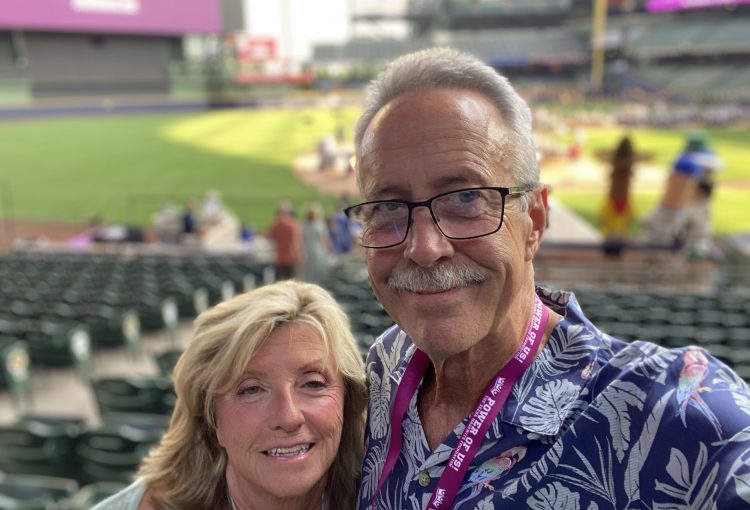Despite a Pancreatic Cancer Recurrence, Don Miller Defies Prognoses as a 5-Year Survivor
Contributing Writer
Julia Brabant
February, 2025
Diagnosed: April 2019
Current Status: Monitors his condition closely while his care team works to determine next steps
At Froedtert & The Medical College of Wisconsin, Don Found a Care Team That Saw Potential Where Others Did Not
When Don Miller’s doctors diagnosed him with pancreatic cancer in April of 2019, he and his wife, Kim, knew they had an uphill battle ahead of them. A successful Whipple procedure granted Don five cancer-free years, but his world shifted once again when the cancer came back in his lung, with some doctors estimating he had 12 – 18 months to live and labeling potential treatment options as mere “Hail Marys.” Yet, Don continues to surpass those expectations, proving that hope, determination and proper care can turn even the darkest diagnoses into stories of survival.
Don’s pancreatic cancer journey began after a routine physical revealed that his liver enzymes were on the higher side of normal, which can indicate a variety of health issues. The following day, one of Don’s colleagues commented that his eyes had a yellowish hue to them, which can be a sign of jaundice, a condition that can occur when bilirubin builds up in the body.
Concerned, Don contacted his doctor, who thought the jaundice might have resulted from a blockage in Don’s bile duct. The worst-case scenario, the doctor said, was that Don might have cancer, so he sent him to Froedtert South, a hospital in Kenosha, Wisconsin, for a follow-up.
Don visited the emergency room at Froedtert South, where doctors suspected his condition might be alcohol-related. However, Don was far from a heavy drinker, so they set him up to have scans, bloodwork and an Endoscopic Retrograde Cholangiopancreatography (ERCP), a procedure used to examine the bile ducts, gallbladder and pancreas, at Froedtert & The Medical College of Wisconsin, a partner institution about 50 miles from Don’s home.
There, Don met with a team of medical professionals, including oncologist Dr. Paul Ritch, surgical oncologist Dr. Kathleen Christians and radiation oncologist Dr. Beth Erickson, all of whom specialize in the treatment of pancreatic cancer. Don’s care team performed a biopsy, but was unable to tell initially if Don was facing a bile duct issue or pancreatic cancer. Don’s case then went before the hospital’s tumor board, with the board recommending Don begin a combination of chemotherapy and radiation to prepare for a Whipple surgery.
Don began having five days of radiation weekly and chemotherapy once a week. After five weeks, he took a break from treatment to build up strength before undergoing the complex procedure. The six-hour Whipple operation, performed by Dr. Christians, led to six days of recovery in the hospital, and Don soon returned home, albeit with a food bag in tow to support his nutritional needs during recovery. After removing Don’s pancreatic tumor, his doctors determined his cancer was Stage 1, placing him among a select few who were fortunate enough to identify and treat pancreatic cancer during its early stages.
Navigating the Days & Weeks After the Whipple
Don did everything he could to streamline recovery, staying out of work for about a month and walking a mile the day after he returned home from the hospital. However, soon after the five-year anniversary of Don’s Whipple procedure, his care team identified small growths in a nodule of one of his lungs. One was particularly concerning, and after keeping an eye on it for a while, doctors recommended Don have the spot biopsied. The initial biopsy didn’t reveal any clear findings, but another, subsequent biopsy confirmed what Don and Kim feared: Don’s pancreatic cancer had come back in one of his lungs.
Now considered Stage 4 due to the metastasis in his lung, Don’s local doctor recommended he start thinking about end-of-life care, suspecting he had up to 18 months to live and referring to potential treatment options as “Hail Marys.” Dismayed at the doctor’s recommendation and dismissal of potential treatment options, Don and Kim returned to Froedtert/MCW, where the care team recommended he treat the recurrence with a combination of chemotherapy, radiation and surgery.
Scans conducted after several rounds of chemo showed that the nodule in Don’s lung had shrunk substantially, and that his cancer antigen numbers had plunged from somewhere in the 40s to somewhere in the high teens. His current doctors, including oncologist Dr. Mandana Kamgar, are now working to determine which spots in his lung to radiate and which spots to remove, but their outlook is positive, and, as a result, so is Don’s. He currently has a pulmonary test set for early January 2025, and then his case will again go before the tumor board to see if surgery is back on the table.
In the meantime, Don will continue his chemo treatments, and while he experienced neuropathy and brain fog the first time around, he found the side effects to be even more pronounced the second time. He’s managed to maintain an appetite for the most part, though, so he’s been lucky not to lose too much weight.
Don does have to take CREON, a digestive enzyme, with meals now, though, and he dealt with diabetes for about six months after his Whipple surgery until his pancreas began functioning again. Now, while he navigates the next stages of treatment, he’s also inching toward retirement, selling his auto repair business to a colleague while transitioning to mostly administrative efforts. With two grandchildren already and another on the way, Don is eager to embrace retirement fully, acknowledging the extra time it gives him to spend with his growing family.
“God gave me a little shove the first time around,” Don said, “Now, he’s saying, ‘Quit!’”
Finding Sources of Support
In the meantime, Don continues to lean on his Kim, who’s accompanied him to every appointment so he wouldn’t have to take on the full burden of keeping up with care and treatment himself.
“She’s my chief advocate; she helps me keep everything straight,” Don said. “She takes the edge off for me, and I don’t have to worry about remembering anything.”
Don’s support system expanded even further after he attended the Seena Magowitz Foundation’s 2024 “Power of Us” fundraiser in Milwaukee, Wisconsin. Surrounded by about 80 other patients with a shared understanding of what it takes to battle the disease, Don found camaraderie and inspiration. He also joined an online group for people who have either had, or are planning to have, Whipple procedures, sharing his own insights and experiences with others while learning from them as well.
“I tell people, ‘If you get diagnosed with pancreatic cancer, go to a place that deals with it,” he said. “Don’t just see a normal oncologist – go see someone who specializes in pancreatic cancer.”
That’s precisely what Don did, finding a path to better treatment through a care team he could trust.
“At this point, I’m just waiting for the end,” he said. “Well, not the real end, but the end of this treatment part, anyway!”
Don continues to monitor his condition closely while his care team works to determine next steps.



